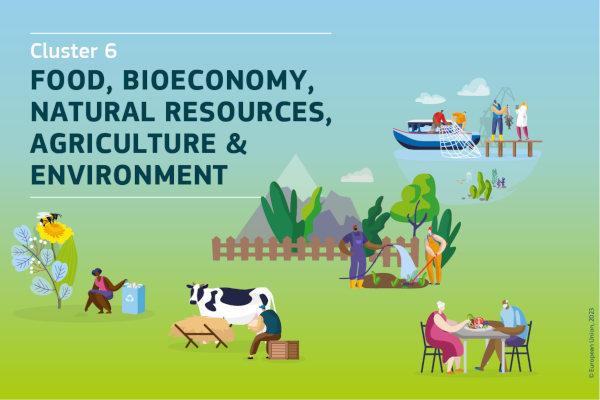Sustainable food systems research and innovation
Business as usual is no longer an option in the way we produce, distribute and consume our food.
Population growth, urbanisation, migration, resource scarcity, climate change and environmental degradation are creating urgent and complex challenges.
Sustainable food systems are about making our food production system fairer, more sustainable and respectful to the environment and reconciling what we eat with the needs of the planet.
Research and innovation are key to making food systems more sustainable, resilient, inclusive and healthy. They are essential to reaching the United Nations’ Sustainable Development Goals and to achieving the policy objectives of the Farm-to-Fork Strategy and the EU Green Deal.
Research and innovation accelerate the transformation of food systems, and contribute to the evidence-base for strengthening their governance.
They also help develop and test solutions, overcome barriers and uncover new market opportunities.
Regional Innovation Valleys for Bioeconomy and Food Systems
In July 2022, the European Commission published the Communication “New European Innovation Agenda” (NEIA). The document presented five important flagships. Under Flagship 3 NEIA introduced the initiative of Regional Innovation Valleys (RIVs).
Policy focus
Funding opportunities
Calls for proposal on bioeconomy-related themes in Horizon Europe and information on the work programme.
Loans for projects in agriculture, forest-based, blue economy, waste management. Loansguaranteed by the European Fund for Strategic Investments for high-risk investment in food production and processing
Funding supporting the deployment of biobased solutions in carbon intensive sectors
The ECBF is part-funded by the Commission and invests in late-stage bioeconomy start-ups
Bioeconomy research related calls can be found in national rural development programmes, European Maritime and Fisheries Fund, Cohesion Fund for renewable energy projects, European Regional Development Fund for smart specialisation
The EU's funding instrument for the environment and climate action
Projects and results
The Commission's primary portal for results of EU-funded research projects in food-related areas.
Stories of particularly successful EU-funded food research projects
Thematic collections of innovative EU-funded research results in food innovation
Latest news, interviews and features about thought-provoking science and innovative research projects funded by the EU.
Access to real-time programme data with the ability to filter by country, region, theme and more.
Platform where framework programme participants present their results for you to search, contact their owners, and form partnerships.
Success stories

EU-funded researchers are looking for alternative sources of protein to balance the environmental impact of meat production.
- Project locations
- Ireland, Austria, Belgium, Denmark, Germany, Italy, Israel, Netherlands, Portugal, Spain, Switzerland, Thailand

The EU-funded Global Mercury Observation and Training network project (ITN GMOS-Train) helped model mercury’s chemical behaviour and fate in land, air and marine environments.
- Project locations
- Slovenia, France, Germany, Italy, Sweden
Collaboration and jobs
Find partners for open EU calls for proposal
BBI JU connects key biobased sectors to ultimately create a sustainable and competitive biobased economy in Europe.
International cooperation in bioeconomy research and innovation helps tackle global challenges
Partnerships with EU countries on food system related issues
Innovation community of industry players, agrifood startups, research centres and universities from across Europe accelerating innovation to transform the food system
Initiative offering a shared strategic research and innovation framework for working towards sustainable bioeconomies in Central and Eastern European countries
Alliance of EU-funded projects dealing with bioeconomy promotion and communication
Strategic advice and orientation to support the EU Food 2030 policy
Researcher jobs in related fields
Scientific publications, tools and databases
Report by the Group of Chief Scientific Advisers on how to achieve a sustainable food system
Platform supporting policy making by bringing together knowledge on the bioeconomy from a wide range of scientific disciplines and sources
Platform bringing together experts and knowledge to help to tackle the root causes of food insecurity around the world.
Scientific food systems related research publications by the European Commission's Joint Research Centre (JRC)
The Commission's Joint Research Centre (JRC) compiles databases and develops software and modelling tools. You can access bioeconomy, agricuture and food research related ones here
Online library of EU bioeconomy, agriculture and food research publications
Single point of access to open data produced by the EU institutions - all data free to use for commercial and non-commercial purposes
All scientific publications from Horizon Europe and H2020 are accessible via OpenAIRE.

2024 marks 40 years since the launch of the EU’s first funding programme dedicated to science, research and innovation. This booklet presents a symbolic 40 stories to illustrate the breadth of R&I made possible through EU R&I funding and some of the results achieved over the last 40 years. It covers...



